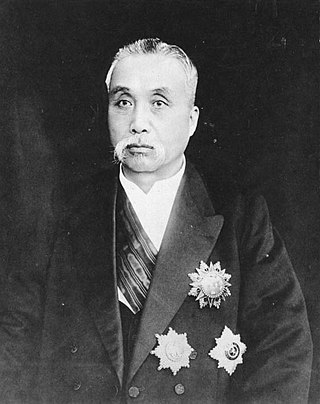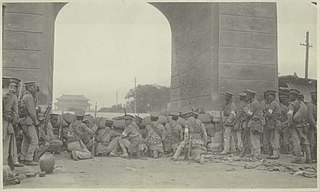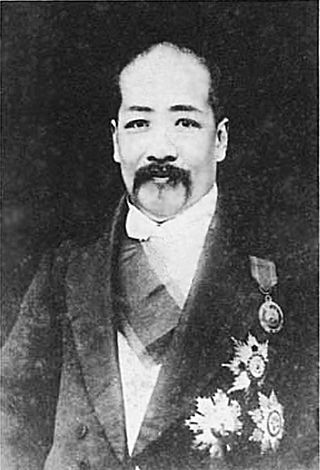
Xu Shichang was a Chinese politician who served as the President of the Republic of China, in Beijing, from 10 October 1918 to 2 June 1922. The only permanent president of the Beiyang government to be a civilian, his presidency was also the longest of the Warlord Era. Previously, he was Minister of the Cabinet of the Imperial Cabinet during the Qing Dynasty.

Li Yuanhong (Chinese: 黎元洪; pinyin: Lí Yuánhóng; Wade–Giles: Li2 Yüan2-hung2; courtesy name 宋卿; Sòngqīng; Sung4-ch'ing1; October 19, 1864 – June 3, 1928) was a prominent Chinese military and political leader during the Qing Dynasty and the Republic of China. He was the Provisional Vice President of the Republic of China from 1912 to 1913 as well as the president of the Republic of China between 1916 and 1917, and between 1922 and 1923.

Hsu Seu-Cheng or Xu Shuzheng was a Chinese warlord in Republican China. A subordinate and right-hand man of Duan Qirui, he was a prominent member of the Anhui clique.

The Beiyang government was the internationally recognized government of the Republic of China between 1912 and 1928, based in Beijing. It was dominated by the generals of the Beiyang Army, giving it its name.
The Anhui clique was a military and political organization, one of several mutually hostile cliques or factions that split from the Beiyang clique in the Republic of China's Warlord Era. It was named after Anhui province because several of its generals–including its founder, Duan Qirui–were born in Anhui.
The Zhili–Anhui War was a 1920 conflict in the Republic of China between the Zhili and Anhui cliques for control of the Beiyang government.
The Constitutional Protection Movement was a series of movements led by Sun Yat-sen to resist the Beiyang government between 1917 and 1922, in which Sun established another government in Guangzhou as a result. It was known as the Fourth Revolution by the Kuomintang. The constitution that it intended to protect was the Provisional Constitution of the Republic of China. The first movement lasted from 1917 to 1920; the second from 1921 to 1922. An attempted third movement, begun in 1923, ultimately became the genesis for the Northern Expedition in 1926.

The Manchu Restoration or Dingsi Restoration, also known as Zhang Xun Restoration, or Xuantong Restoration, was an attempt to restore the Chinese monarchy by General Zhang Xun, whose army seized Beijing and briefly reinstalled the last emperor of the Qing dynasty, Puyi, to the throne. The restoration lasted just less than two weeks, from July 1 to July 12, 1917, and was quickly reversed by Republican troops. Despite the uprising's popular name, almost all putschists were ethnic Han.

Cheng Biguang (程璧光) was a Chinese admiral from the late Qing Dynasty and later the Republic of China. He served in the Beiyang Fleet and the Republic of China Navy. When Duan Qirui refused to validate the Constitution, Cheng and fellow Admiral Lin Baoyi sailed their fleets down south to join with the 'Constitutional Government' of Sun Yat-sen. He was assassinated in Haizhu District, Guangzhou, in 1918.

Wang Shizhen, courtesy name Pinqing (聘卿), was a Chinese general and politician of the Republic of China.
The Anfu Club was a political organisation in China. It controlled the National Assembly of the Republic of China after the elections of 1918. The organisation was forced to disband after the defeat of its patrons, the Anhui Clique, during the Zhili–Anhui War. The club was formed on 8 March 1918 from the Zhonghe Club, a political group organised by Jin Yunpeng on the order of Duan Qirui on 27 March 1917. The Anfu Club was primarily organised by Duan's right-hand man, Xu Shuzheng, along with the politicians Wang Yitang, Zeng Yujun, Liu Enge and others. At its height, the organisation controlled roughly 330 seats in the National Assembly. The Club got its name from Anfu Hutong, the street on which the members meet.

Wang Yitang was a politician and military leader in the Qing Dynasty and Republic of China. He belonged to the Anhui clique and formed the Anfu Club (安福俱樂部). Later he became an important politician in the Provisional Government of the Republic of China and the Reorganized National Government of the Republic of China. His former name was Zhiyang (志洋) and his courtesy names were Shenwu (慎吾) and Shengong (什公). Later, his name was changed to Geng (賡) while his courtesy name was changed to Yitang (一堂). He was also known by his art name Yitang (揖唐). He was born in Hefei, Anhui.
Events in the year 1952 in China.

Duan Qirui was a Chinese warlord, politician and commander of the Beiyang Army who ruled as the effective dictator of northern China in the late 1910s. He was the Premier of the Republic of China on four occasions between 1913 and 1918, and from 1924 to 1926 he served as acting Chief Executive of the Republic of China in Beijing.

1911 Revolution is a Chinese television series based on the events of the Xinhai Revolution, which brought an end to imperial rule in China in 1911. It was first broadcast on CCTV-1 during prime time on 27 September 2011. It was specially produced to mark the 100th anniversary of the Xinhai Revolution.

Qian Nengxun, courtesy name Ganchen (干臣) or Gancheng (干丞) was a Chinese politician from 1918 until his death in 1924. He served as the Premier of the Republic of China twice during the Warlord Era, in 1918 and 1919 and was the protegee of former president Xu Shichang. In 1922, Qian co-founded the charitable Red Swastika Society.
Events from the year 1936 in China.
Lu Jianzhang was a general of the late Qing dynasty and early Republican period of China.
Events in the year 1917 in China.
Events in the year 1916 in China.











